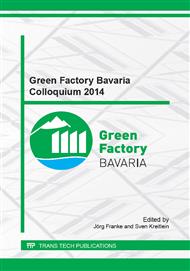[1]
Deutsches Institut für Normung (German Institute for Standardization), DIN 40110: 2002-09: Wechselstromgrößen – Teil 2: Mehrleiter-Stromkreise (Quantities used in alternating current theory – Part 2: Multi-conductor circuits), Beuth Verlag, Berlin (2002).
DOI: 10.31030/9413829
Google Scholar
[2]
T. Mühl, Einführung in die elektrische Messtechnik – Grundlagen, Messverfahren, Geräte (Introduction to electrical measurements - Fundamentals, methods of measurement, devices), third ed., Vieweg+Teubner Verlag, Wiesbaden (2012).
DOI: 10.1007/978-3-8348-2063-1
Google Scholar
[3]
G. Schnell, B. Wiedermann (ed. ), Bussysteme in der Automatisierungstechnik (Bus systems in automation engineering), eight ed., Vieweg+Teubner Verlag, Wiesbaden (2011).
Google Scholar
[4]
Specification from data sheet of current transformers on http: /www. redur. de.
Google Scholar
[5]
J. Lange, F. Iwanitz and T.J. Burke, OPC - von Data Access bis Unified Architecture (OPC – from data access to unified architecture), fourth ed., VDE-Verlag, Berlin (2010).
DOI: 10.3403/30283049
Google Scholar
[6]
S. Spreng, F. Risch, T. Gläßel, J. Wolff and J. Franke, Evaluation of Energy Efficient Joining Processes in the Field of Electric Drives Manufacturing Considering Quality Aspects, submitted to 4th International Electric Drives Production Conference (EDPC) (2014).
DOI: 10.1109/edpc.2014.6984393
Google Scholar
[7]
S. Spreng, J. Kohl and J. Franke, Automatisierte Erweiterung bestehender Materialflusssimulationen durch Energieaspekte (Automated extenstion of existing material flow simulations by energy Aspects) in: ZWF-Zeitschrift für wirtschaftlichen Fabrikbetrieb, 9/2013, Carl Hanser Verlag, München 2013, pp.647-651.
DOI: 10.3139/104.110992
Google Scholar
[8]
J. Kohl, S. Spreng and J. Franke, Discrete event simulation of individual energy consumption for product-varieties, in: H. ElMaraghy (Ed. ), Procedia CIRP, Volume 17, 2014 pp.517-522.
DOI: 10.1016/j.procir.2014.01.088
Google Scholar
[9]
J. Kohl, S. Spreng and J. Franke, Minimization of energy needs in the industry of electric drives manufacturing considering process-related temperature curves, submitted to 4th International Electric Drives Production Conference (EDPC) (2014).
DOI: 10.1109/edpc.2014.6984430
Google Scholar


